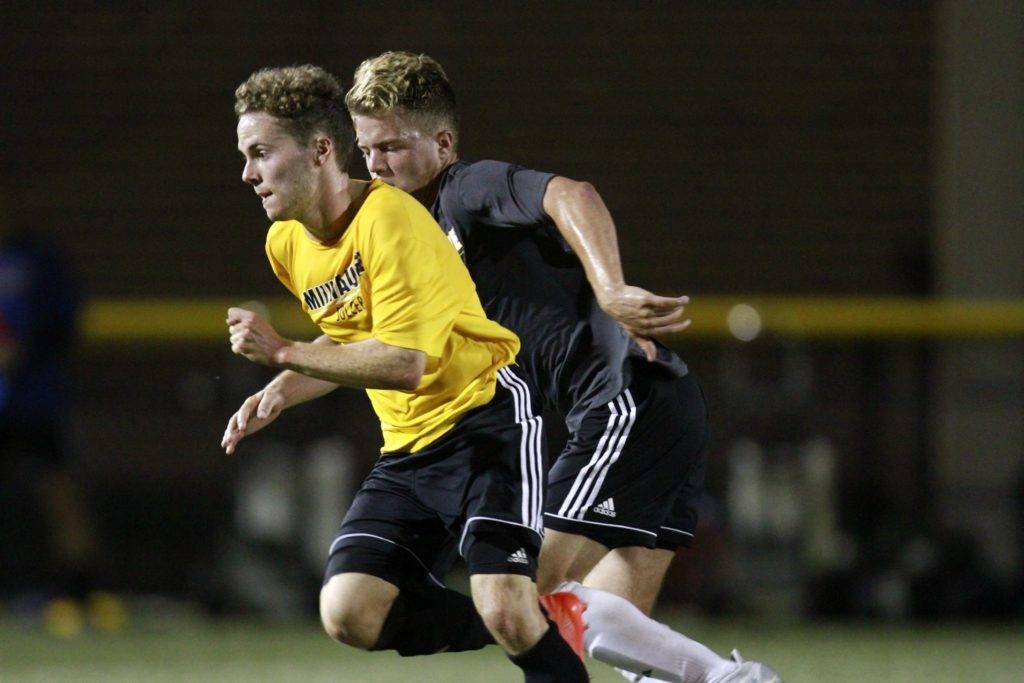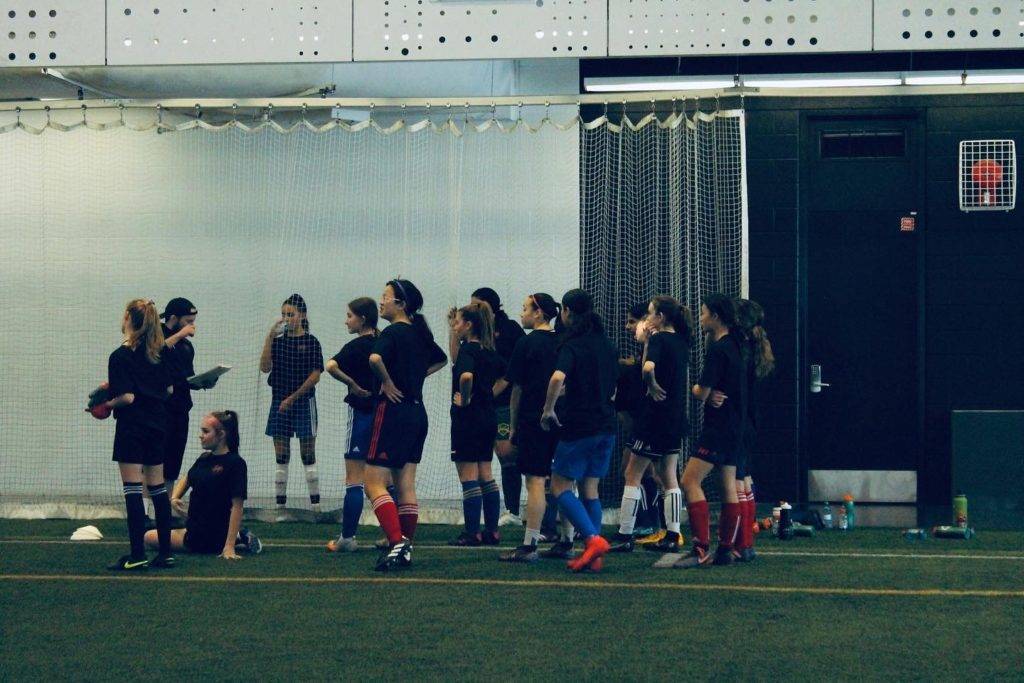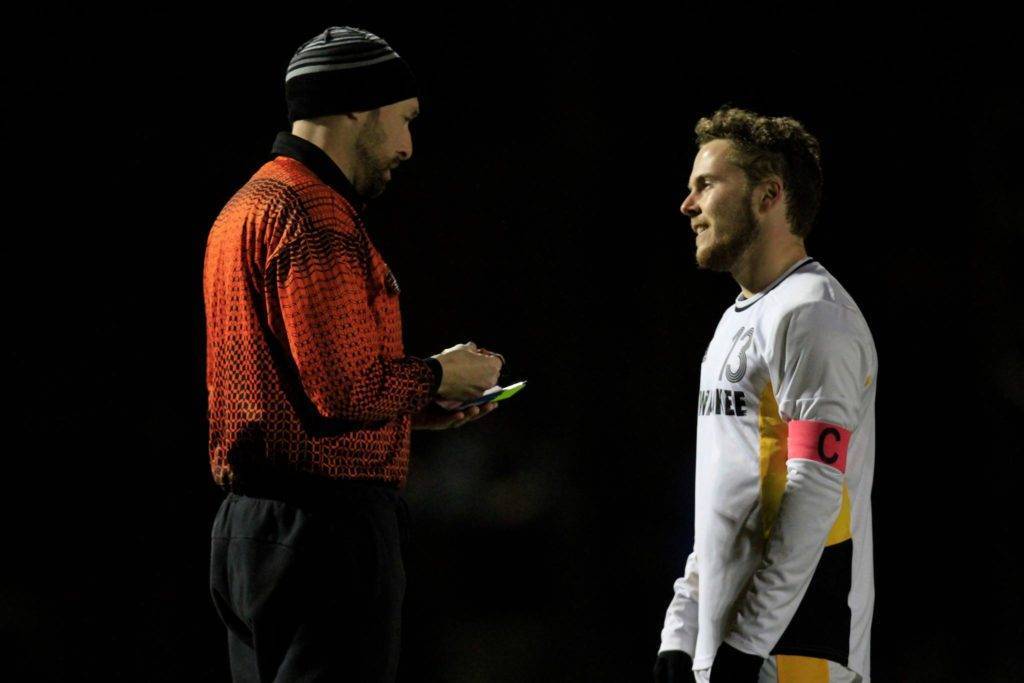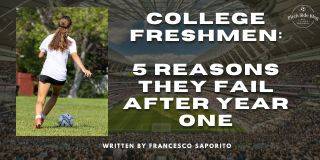The jump from high school & youth club soccer to post-secondary football can be one of the most challenging tasks individuals will face in their lifetimes.
For some, they’re too much to handle, leading many to quit their program, abandon their scholarships, and ultimately quit the sport altogether.
The change in culture, environment, new teammates, different coaches, higher competition, challenging academics, all play a significant role for freshmen in their first year of collegiate athletics.
Many times, athletes aren’t prepared, mentally and physically, to take on these exasperate changes.
They’re unexpected, gruelling, and test you to the limit, day in and day out.
You’ve faced challenges as a youth footballer, I know .. but they won’t compare to the ones I’m going to mention below.
This is why I’ve put together the top 5 reasons college freshmen FAIL after just one year in post-secondary athletics.
This blog is not here to scare you as a youth footballer or parent, but to give you insight no one else will.
These reasons will give you the upper hand on those that aren’t prepared, and ready to take that step towards success.

1) Balancing Academics & Athletics
Although you need to balance these as a youth footballer, both are taken to a MUCH higher level in terms of the overall demand.
Post-secondary academics and the intentional work demanded each and every day is nothing like high school.
Lectures are bulked with information, labs are detail-oriented, discussions are intense, and professor’s are not going to let much, if anything, slide just because you’re a student-athlete.
If anything, they’ll demand more from you.
In addition, to compete, many programs and organizations require athletes to accumulate a certain GPA standard semester to semester.
If you don’t keep up to these standards, you’ll lose your scholarship, your spot in the line up, and potentially, your spot on the team.
Athletic levels are also elevated exponentially.
No more 2x per week sessions + 1 game per week like club.
Now it’s 4-5 on field sessions per week, 2-3 gym sessions per week, 1-2 games per week, in addition to any team events, community events, workshops, and anything else on the agenda.
Safe to say, the schedule isn’t set up for the light hearted.
2) Business is Business
The next reason why many freshmen fail, is due to the fact … business is business.
There is no more pay to play.
There is no more reason to feel entitled to things like playing time, a starting spot, or A’s in the classroom.
In post-secondary athletics, there is A LOT of money on the line in various forms.
Scholarships, coaching jobs, trainer’s wages, administration salaries all have to be paid for.
No one, especially your coach, owes you anything, especially playing time.
If the coach doesn’t think you’re going to help the team win and earn a result, then they will not play you.
Think of it this way.
A team isn’t getting results.
Administration and athletic director’s have to ensure program success.
Ultimately, the coach gets fired.
Meaning they are out of the job, meaning they cannot support themselves and their families.
Business is business. Remember that.

3) Time Management
A third challenge that approaches is time management.
You quickly realize as a student-athlete the sacrifices you need to make, and the things you can’t afford to do as often as you once used to.
With all the training sessions, games, traveling to different parts of the country on weekends for matches and tournaments, academic demands, in addition to sleeping, it’s pretty tough to do anything else, especially during season.
Hanging out with friends, playing video games, watching TV, seeing your family – most of these take a back seat when you become a post-secondary student athlete.
Some can make these sacrifices, some of a tougher time dealing with this reality.
At the end of the day, it’s about realizing that post-secondary athletics is a once in a life time opportunity.
Sacrifices are required. How you deal with them, is based on what you see as the long term goal.
4) The Competition
If you’re playing post-secondary football, chances are you were one of the best at the club level.
You started every game, received praise from fans each and every match, and the coach gave you regular positive feedback.
But now, as a freshmen, everyone is just as, if not faster, stronger, smarter and better than you’ve ever been.
Especially if you’re a true freshmen coming out of high school at 18 years old, competing against players that are 20, 24, maybe even 28 years old and older, can be exhausting.
You have to be a very unique player to jump straight into a post-secondary team and think about getting into the starting XI right away.
You have to learn new tactical strategy.
You have to learn how to play with your new team-mates
Amongst an entirely new type of environment.
You have to learn almost an entire new game in college soccer.
Essentially, you have to put in even MORE work if you REALLY want it.
This can be difficult for freshmen to prosper in their minds, considering all the work it can take to get to post-secondary athletics.
The end of the day, you will have to be patient.

5) Injuries, Physical, and Mental Fatigue
Post-secondary athletics proposes a high physical demand for athletes.
As mentioned, during the season from August to November, you’re demanded weekly to train 4-5x, play 1-2 games, strength train 2-3x and continue this at a high intensity for 12-16 weeks straight.
Many players face both physical & mental fatigue, leading to various injuries.
The necessity to take care of yourself is more than ever.
What you eat, how much you sleep, how often you see the trainers & physio, your warm ups, your cool downs; all these off the field aspect will play a big role avoiding unnecessary injuries.
Summary
Again, this blog wasn’t created to scare players, but instead to make them aware of the massive changes that come with post-secondary athletics.
Use the information here to start preparing NOW!
Eat well, sleep well, commit to more training, get A’s in school, treat your club soccer like a business.
It’s all about preparation.
Have any questions? Contact me, Francesco, and I’d be happy to help and answer any questions I can!

